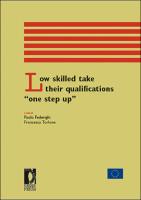Low skilled take their qualifications "one step up"
| dc.contributor.editor | Federighi, Paolo | |
| dc.contributor.editor | TORLONE, FRANCESCA | |
| dc.date.accessioned | 2022-05-31T10:17:18Z | |
| dc.date.available | 2022-05-31T10:17:18Z | |
| dc.date.issued | 2010 | |
| dc.identifier | ONIX_20220531_9788864531793_216 | |
| dc.identifier | OCN: 971086613 | |
| dc.identifier.issn | 2704-5846 | |
| dc.identifier.uri | https://library.oapen.org/handle/20.500.12657/54932 | |
| dc.description.abstract | Adult learning is recognized as a key component of lifelong learning and Member States are required to remove barriers to participation, to increase overall quality and efficiency in adult learning, to speed up the process of validation and recognition and to ensure sufficient investment in and monitoring of the field (European Commission, 2006, 2007; European Parliament, 2008; European Council, 2008). It is unanimously recognized that adult learning can play a pivotal role in meeting the goals of the Lisbon Strategy, by fostering social cohesion, providing citizens with the skills required to find new jobs and helping Europe to better respond to the challenges of globalisation. Such needs are taken into consideration in this Volume where the main issues faced are related to what 33 European countries have been doing in order to raise the skills levels of low-skilled workers, address the problem of the high number of early school leavers, combat social exclusion, ensure the efficiency, effectiveness, quality of adult learning. | |
| dc.language | English | |
| dc.relation.ispartofseries | Proceedings e report | |
| dc.subject.other | Pedagogia | |
| dc.title | Low skilled take their qualifications "one step up" | |
| dc.type | book | |
| oapen.identifier.doi | 10.36253/978-88-6453-179-3 | |
| oapen.relation.isPublishedBy | bf65d21a-78e5-4ba2-983a-dbfa90962870 | |
| oapen.relation.isbn | 9788864531793 | |
| oapen.relation.isbn | 9788864531748 | |
| oapen.relation.isbn | 9788892737013 | |
| oapen.series.number | 65 | |
| oapen.pages | 120 | |
| oapen.place.publication | Firenze |

